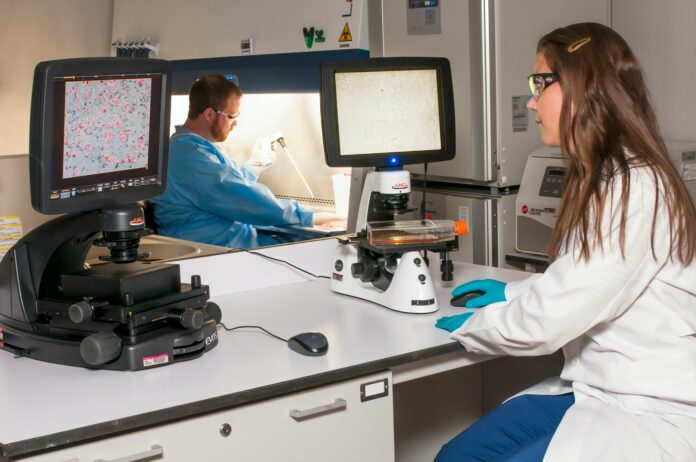JAB – which will be given to those who are at the highest risk of developing illness – will train the immune system to recognize and attack the early signs of illness.
Experts have dubbed it a ‘critical moment’ in the fight against devastating illnesses, which affect 48,500 people annually in Britain.
Introducing ‘LungVax,’ a revolutionary vaccine born from the synergy of minds at Oxford University, the Francis Crick Institute, and University College London.
The cells of lung cancer appear distinct from normal cells due to a protein called ‘red flag’ within the DNA of cancer cells.
Mutations within the DNA of the cell create antigenic cells, which are visible on the surface of the cell.
The LungVax vaccine will carry a strand of DNA that trains the immune system to recognize these newborn antigens on abnormal lung cells.
It will then activate the immune system to kill these cells, preventing lung cancer.
Professor Tim Elliot, lead researcher at the University of Oxford, stated, “Cancer is an illness of our bodies, and it’s challenging for the immune system to discern what’s normal and what’s cancerous.
“Unleashing the immune system’s prowess against cancer marks a pivotal frontier in modern oncology, brimming with formidable challenges yet offering unprecedented avenues for breakthroughs.”
“This research could provide an off-the-shelf vaccine based on Oxford’s vaccine technology, which has proven itself during the COVID pandemic.”
“Emulating the triumphs from pandemic trials holds the key to annually rescuing countless lives in Britain, an opportunity to turn adversity into salvation.”
Cancer researchers have received funding of up to £1.7 million from Cancer Research UK and the Chris Cancer Foundation.
The team will use the funds to support the initial production of 3,000 doses of the vaccine over the next two years in laboratory research and the Oxford Clinical Biomanufacturing Facility.
If successful, the vaccine will undergo direct clinical trials, including individuals at the highest risk, such as those with current or past smoking habits eligible for lung health checks in certain parts of the UK.
Less than 10% of those afflicted with lung cancer survive their illness for 10 years or more.
According to Professor Mariam Jamal-Hanjani from University College London and the Francis Crick Institute, our models suggest the vaccine could target 90% of lung cancer cases, with this funding propelling us closer to patient trials.
“LungVax won’t replace smoking cessation as the best way to reduce your risk of lung cancer.”
“But it could provide a viable route to prevent some early-stage cancers from developing.”
Lola Monterola, chairperson of the Chris Cancer Foundation, said, “We are at a crucial moment in cancer research and treatment history.”
“For the first time, technology and knowledge of the immune system are allowing us to take the first step towards stopping cancer.”
“This groundbreaking study represents a solid step in that direction, and we believe it’s essential to support it in CRS.”



